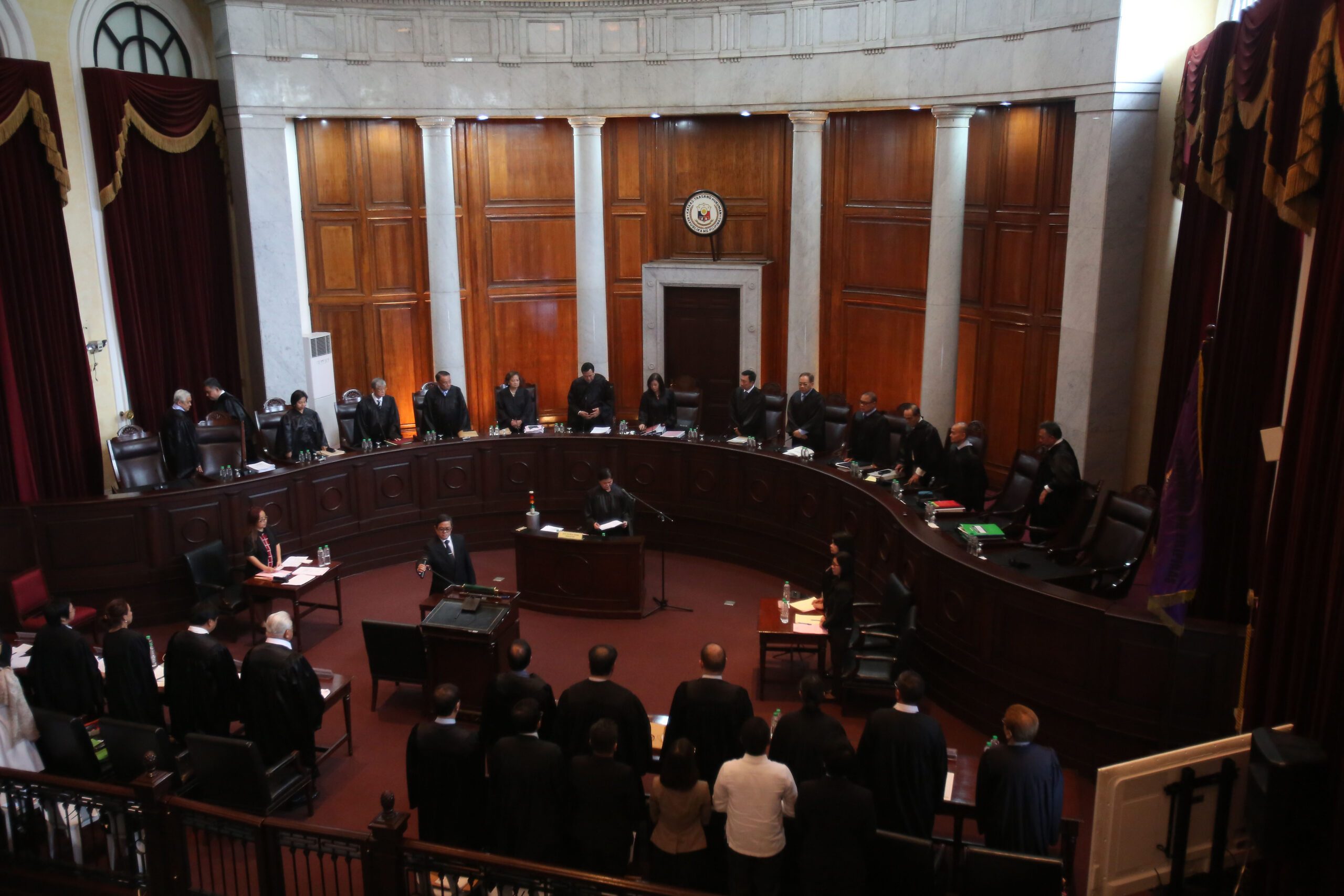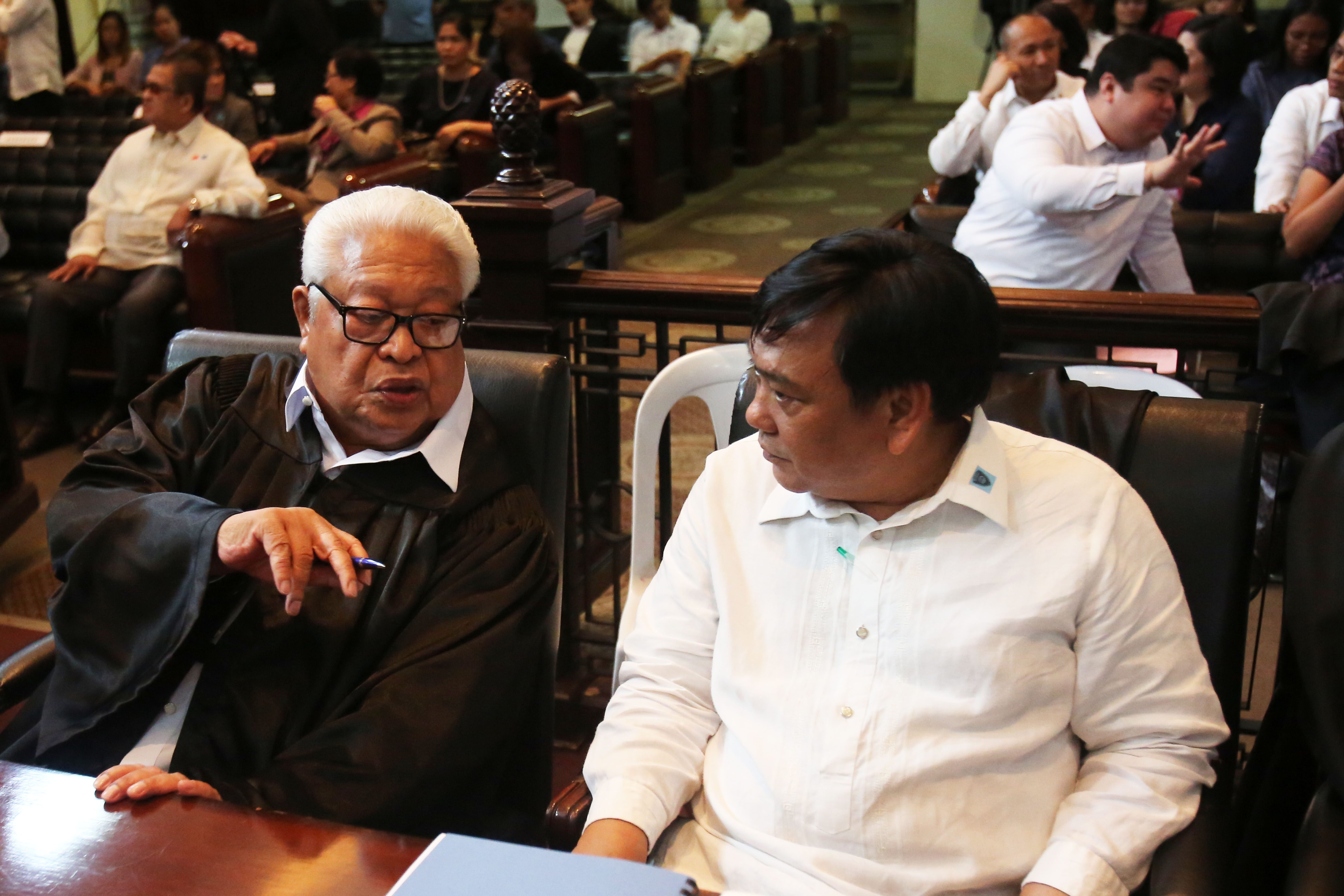SUMMARY
This is AI generated summarization, which may have errors. For context, always refer to the full article.

MANILA, Philippines (UPDATED) – Associate Justice Mariano del Castillo during his interpellation of anti-martial law petitioners on Tuesday, June 13, indicated that the siege in Marawi can be considered an act of rebellion, and therefore sufficient basis to declare martial law in Mindanao.
For Del Castillo, the presence of foreign terrorists in Marawi City – especially the raising of an ISIS flag there – is sufficient basis to say that it is a case of rebellion. (READ: Military knew as early as April the Marawi attack plan – Calida)
“They’re precisely putting up their flag there to supplant the authority of the local government of their own, in effect they’re trying to remove the allegiance of Marawi City from the government,” Del Castillo told Albay First District Representative Edcel Lagman, who argued for the minority lawmakers group of petitioners.
But Lagman stuck to his old argument and said the raising of an ISIS flag is the terror groups’ longtime resort to “cheap propaganda.”
Del Castillo was the first justice to interpellate petitioners before the break shortly before noon. (READ: Nullify martial law? Your guide to the SC oral arguments)
Jurisdiction

Del Castillo’s line of questioning on Tuesday was geared against the petitioners, even saying that the SC may not have jurisdiction over Lagman’s petition.
“You have denominated your petition as a petition under Paragraph 3, Section 18 of Article VII, this is not one of the cases in Section 5, Article 8 of the Constitution that provides jurisdiction to the Supreme Court,” Del Castillo told Lagman.
The provision cited by Del Castillo lists down the cases where the SC shall have the power over – “cases affecting ambassadors, other public ministers and consuls, and over petitions for certiorari, prohibition, mandamus, quo warranto, and habeas corpus.”
The same provision also gives the SC the power to “review, revise, reverse, modify, or affirm on appeal or certiorari” cases which question the constitutionality or validity of “any treaty, international or executive agreement, law, presidential decree, proclamation, order, instruction, ordinance, or regulation.”
The petition filed by Lagman’s group is called a “Petition under Paragraph 3, Section 18 of Article VII.”
The said provision details the powers and limitations of the President in declaring martial law and authorizes the SC to “review, in an appropriate proceeding filed by any citizen, the sufficiency of the factual basis of the proclamation of martial law or the suspension of the privilege of the writ or the extension thereof.”
“Don’t you think that the phrase ‘appropriate proceedings’ in Section 18, Article VII refers to a case enumerated in Section 5, Article VIII?” Del Castillo asked Lagman.
For Lagman, the Constitutional provision in Section 18, Article VII is sufficient for the SC to review martial law.
“This is not a petition for certiorari, it is not a petition for prohibition, because there has to be an arbitrariness or capriciousness of the respondent or the President issuing the proclamation amounting to grave abuse of discretion. But we don’t have to go into that, because we are working under the specific provision of the Constitution apart from the general jurisdiction,” Lagman, a human rights lawyer, said.
As petitioners’ counsel Marlon Manuel explained while being interpellated by Associate Justice Marvic Leonen during the afternoon session, it doesn’t matter that there are specific cases laid down by the law cited by Del Castillo. What matters is that the martial law provision in the Constitution gave the SC the specific powers to review the basis of martial law.
Consultation
One of Lagman’s arguments is the admission of Defense Secretary Delfin Lorenzana that President Rodrigo Duterte did not consult him or his security officials when he declared martial law from Moscow, Russia on May 23.
Solicitor General Jose Calida already said that the Constitution gives Duterte the sole power to declare martial law. (READ: Calida invokes technicality to have martial law petitions dismissed)
In his interpellation, Del Castillo asked Lagman the possible implications if Duterte had consulted the military and they advised him not to declare martial law.
“Are you saying the act of the President now will have to be revoked by Congress or the SC can nullify the proclamation, just because they conflict with the President’s decision?” Del Castillo asked.
Lagman said yes: “The issuance of the declaration against the advice and counsel of the military is flawed and should be struck down by the Supreme Court, because there is no factual basis, because the military said there is no basis to declare martial law.” – Rappler.com
Add a comment
How does this make you feel?


![[In This Economy] Can the PH become an upper-middle income country within this lifetime?](https://www.rappler.com/tachyon/2024/04/tl-ph-upper-income-country-04052024.jpg?resize=257%2C257&crop=295px%2C0px%2C720px%2C720px)


There are no comments yet. Add your comment to start the conversation.